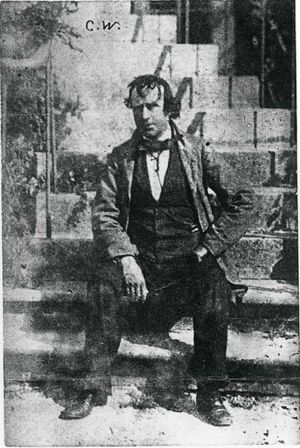Charles Samuel West
Biography
Charles Samuel West was born in Isleworth, Middlesex, England, in 1809. Little is known about his early years, but it appears that he may have been either in the Royal or Merchant Navies from a comment later in his writings. He was sent to Canada, perhaps with the Earl of Durham, in 1837-8 to report to the British Government on the uprising in Lower Canada (the French Division), and it was there that he had the idea of using Professor Samuel Morse's recent invention of the electric telegraph (1838) to convey his reports to London faster than he could send them by surface routes. His idea was frustrated because there was no satisfactory method of insulating a wire conducting an electric current under water. On his return to England in 1838 or '39, he undertook investigations lasting several years into the best method of achieving a satisfactory insulating medium, and at last hit upon the idea of using India rubber. He did this in conjunction with the firm of S. W. Silver. It had been associated with Charles Macintosh, who had developed a method of impregnating cloth with India rubber to render it waterproof for the manufacture of clothing.
In 1847, West obtained permission from the Admiralty to carry out experiments between two warships, the Pique and the Blake, in Portsmouth Harbour, and succeeded in sending messages between them. After this triumph the cable was recovered by the Admiralty and laid across the harbor itself with equal success.
West applied to both the British and French Governments for permission to lay a cable across the Channel, but was frustrated by lack of funds, even though many influential persons, Sir Joseph Paxton and Charles Dickens among them, expressed great interest in the project. In 1850, two brothers, Jacob and John Brett, took over the permission that West had obtained to lay the cable, without apparently his knowledge or consent. Further, they had at that time sufficient finances to enable them to go ahead, and although they eventually went bankrupt, they completed the laying of the cable between Dover and Cap Gris Nez on August 31st, 1850, to comply with the time limit that West had arranged with the French. They had little or no grasp of the technology of what they were trying to achieve. Unfortunately, the next day a French fisherman caught the cable with his anchor and hauled it into his boat where he cut a length out of it. He took it into Boulogne where he exhibited it as a new species of sea weed with a gold core in its stem.
At that time the cable was insulated with gutta percha from Malaya. West was always an advocate for the use of India rubber from South America because of its superior qualities of insulation, ageing, flexibility, and resistance to temperature changes. He named his youngest daughter after the source of the best India rubber that he could find, Para, in Brazil. He gave a lecture to the Royal United Service Institution on 8 February 1861 in which he advanced his argunents for his preference for India rubber over gutta percha.
West wrote a somewhat whimsical book called The Story of my Life, as told by the submarine cable, in 1859, which sets out the trials and tribulations of his invention.
West lived in France from 1860. He was with his family first in Boulogne until 1869, and then in Paris at Boulevard de Clichy 43, until he had to leave at the outbreak of the Franco-Prussian War in 1870. At that time he is recorded in the Didot-Bottin guide to Paris as an "ingenieur civil." After the war, he returned to Paris with his family but to Clichy 39. They stayed there until 1875, when they moved to Rue Blanche 5. They were still there in 1876, but as there are no references to Charles Samuel West after this date in the annual records, it can be assumed that he returned to London with his family. It is not certain what West was doing, although he refers to himself in documents as a telegraph engineer. He may have worked for Siemens. (There is no doubt that his future son-in-law worked for this firm later, and this may be how his daughter and son-in-law met.)
At the fiftieth anniversary of the invention of the electric telegraph in 1887, which was celebrated in London but to which West was not invited, he wrote to the Morning Post on the subject. His youngest daughter Alice Para Mary West, later Hervey, was married on 19 November 1890. Her marriage certificate gives her father as Charles Samuel West, deceased, all of which implies that he died between 1887 and 1890.
